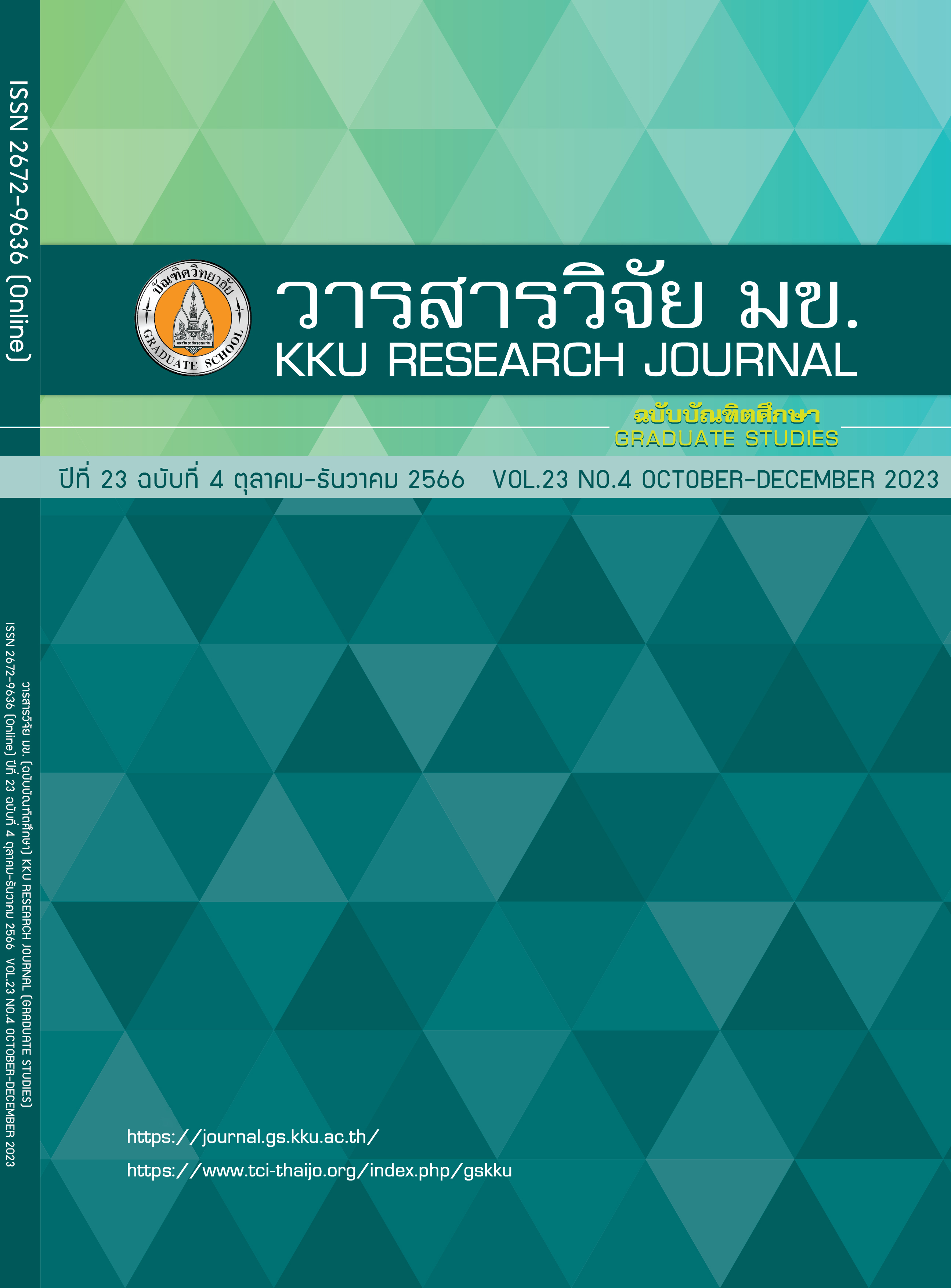Factors Influencing Intercity Bus Travel During the COVID-19 Pandemic
Keywords:
Public bus, Health belief model, COVID-19 PandemicAbstract
The objective of this study is to examine factors that influence intercity travel by public bus during COVID-19 pandemic by applying Health Belief Model (HBM). Researchers surveyed the attitude toward an intercity travel by public bus among 275 students of Faculty of Engineering, Khon Kaen University through an online questionnaire. Multiple Indicators and Multiple Causes Structural Equation Model (MIMIC SEM model) was applied to analyze the data. Results revealed that cues to action, perceived barriers, and self-efficacy have a significant influence on intercity travel by public bus during COVID-19 pandemic. The findings would be recommended to determine measures for intercity public bus service in the future when the pandemic occurs.
References
World Health Organization (WHO). Novel Coronavirus (2019-nCoV): situation report, 1 [Internet]. 2020 [cited 2021 January 1]. Available from https://apps.who.int/iris/handle/10665/330760
Shakibaei S, de Jong GC, Alpkökin P, Rashidi TH. Impact of the COVID-19 pandemic on travel behavior in Istanbul: A panel data analysis. Sustain Cities Soc. 2021; 65.
Beck MJ, Hensher DA. Insights into the impact of COVID-19 on household travel and activities in Australia – The early days under restrictions. Transp Policy. 2020; 96: 76–93.
Anwari N, Ahmed MT, Islam MR, Hadiuzzaman M, Amin S. Exploring the travel behavior changes caused by the COVID-19 crisis: A case study for a developing country Nafis. Transp Res Interdiscip Perspect. 2021; 9.
Jaruwattananon J, Chalermpong S, Thaithatkul P. Effects of Covid-19 Preventive Measures on Travel Behavior of Rail Transit Passengers. In: Ncce26; 2021 June 23-25; Online Conference; 2021. Thai.
Beck MJ, Hensher DA. Insights into the impact of COVID-19 on household travel and activities in Australia – The early days of easing restrictions. Transp Policy. 2020; 99: 95–119.
Kim W, Hong SH. The effect of covid-19 on the efficiency of intercity bus operation: The case of chungnam. Sustain. 2021; 13(11).
Department of Disease Control. DDC COVID-19 Interactive Dashboard | 1-dash-tiles-w [Internet]. 2022 [cited 2022 Jan 1]. Available from: https://ddc.moph.go.th/covid19-dashboard/ Thai.
Royal Thai Government. The Emergency Decree on Public Administration in Emergency Situations B.E. 2548 (2005) [Internet]. 2021 [cited 2021 Dec 1]. Available from: https://www.thaigov.go.th/news/contents/details/27963 Thai.
Ministry of Public Health. Recommendations for the area for the preparation of disease prevention and control measures according to the requirements for the type of public transport business. Guidelines for compliance with business relief measures and activities to prevent the spread of COVID-19, Group 1; 2020. p. 44-46. Thai.
Department of Land Transport. Statistics of passenger terminal usage. Transport statistics report for the fiscal year 2022 for the month of October 2021; 2021. p. 43. Thai.
Department of Land Transport. Statistics of passenger terminal usage [Internet]. 2022 [cited 2022 Jan 1]. Available form: https://web.dlt.go.th/statistics/ Thai.
Rosenstock IM, Strecher VJ, Becker MH. Social Learning Theory and the Health Belief Model. Heal Educ Behav. 1988; 15(2): 175-183.
Glanz K, Rimer BK, Viswanath K. Health Behavior and Health Education. A Wiley Imprint; 2008. p. 45-62.
Vanichbuncha K. Analysis Structural equations with Amos. Samlada Ltd. 2019. Thai.
Tungfung R. The analysis of MIMIC model: The using of LISREL program trial version for research. The Association of Researchers of Thailand. 2013; 18(2): 128–140. Thai.
Cahyanto I, Wiblishauser M, Pennington-Gray L, Schroeder A. The dynamics of travel avoidance: The case of Ebola in the U.S. Tour Manag Perspect. 2016; 20: 195–203.
Huang X, Dai S, Xu H. Predicting tourists’ health risk preventative behaviour and travelling satisfaction in Tibet: Combining the theory of planned behaviour and health belief model. Tour Manag Perspect. 2020; 33.
Wong MCS, Wong ELY, Huang J, Cheung AWL, Law K, Chong MKC, et al. Acceptance of the COVID-19 vaccine based on the health belief model: A population-based survey in Hong Kong. Vaccine. Forthcoming 2021.
Jadil Y, Ouzir M. Exploring the predictors of health-protective behavior during the COVID-19 pandemic: A multi-country comparison. Environ Res. 2021; 199.
Alhalaseh L, Fayoumi H, Khalil B. The Health Belief Model in predicting healthcare workers’ intention for influenza vaccine uptake in Jordan. Vaccine. Forthcoming 2020.
Liao Q, Cowling BJ, Lam WWT, Fielding R. Factors Affecting Intention to Receive and Self-Reported Receipt of 2009 Pandemic (H1N1) Vaccine in Hong Kong: A Longitudinal Study Qiuyan. PLoS One. 2011; 6(3).
Buglar ME, White KM, Robinson NG. The role of self-efficacy in dental patients’ brushing and flossing: Testing an extended Health Belief Model. Patient Educ Couns. 2010; 78(2): 269–272.
Shitu K, Adugna A, Kassie A, Handebo S. Application of Health Belief Model for the assessment of COVID-19 preventive behavior and its determinants among students: A structural equation modeling analysis. PLoS One. 2022; 17(3).
Anagnostopoulos F, Dimitrakaki C, Niakas D, Tountas Y. Validity and reliability assessment of health belief scales for mammography screening in Greek asymptomatic women. Psycho-Oncology. 2013; 22: 1912–1917.
Yoo W, Choi DH, Park K. The effects of SNS communication: How expressing and receiving information predict MERS-preventive behavioral intentions in South Korea. Comput Human Behav. 2016; 62: 34–43.
Akompab DA, Bi P, Williams S, Grant J, Walker IA, Augoustinos M. Heat waves and climate change: Applying the health belief model to identify predictors of risk perception and adaptive behaviours in Adelaide, Australia. Int J Environ Res Public Health. 2013; 10(6): 2164–2184.
Hair JF, Anderson RE, Tatham RL, Black WC. Multivariate Data Analysis. Annabel Ainsco; 2019.
Tankasem P, Satiennam T, Satiennam W, Jaensirisak S, Rujopakarn W. Effects of automated speed control on speeding intention and behavior on mixed-traffic urban arterial roads. IATSS Res. Forthcoming 2022.
Tashiro A. Assessing green management in health belief model: An analysis of a post-disaster rural context. J Environ Manage. 2022; 302.
Downloads
Published
Issue
Section
License
Copyright (c) 2023 KKU Research Journal (Graduate Studies)

This work is licensed under a Creative Commons Attribution-NonCommercial-NoDerivatives 4.0 International License.



